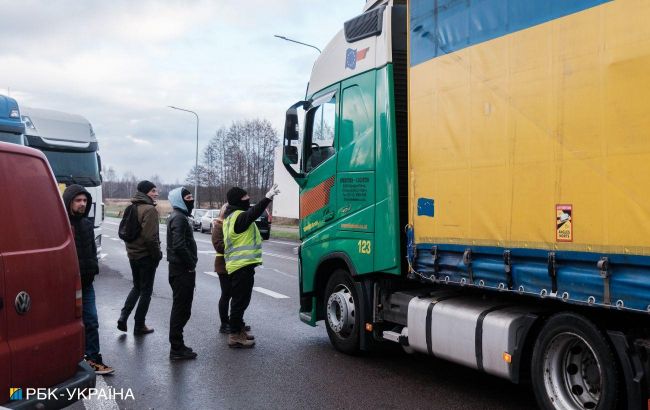Ukrainian border blockade: Unfolding situation in Poland, Slovakia, and Hungary
 The border blockade continues (Vitalii Nosach, RBC-Ukraine)
The border blockade continues (Vitalii Nosach, RBC-Ukraine)
Carriers from Poland and Slovakia continue to block the border with Ukraine. Thousands of trucks are standing in queues, the spokesperson of the State Border Service of Ukraine, Andrii Demchenko, reports.
As of the morning of December 4, about 2,500 cargo vehicles are in queues on the border with Poland in the direction of Ukraine. The biggest one is opposite the Rava-Ruska checkpoint.
"Well, the border with Slovakia also continues to be blocked. As of this morning, according to the Slovak border guards, there are about 650 cargo vehicles in the queue towards Ukraine with the possibility of crossing the border," he says.
Demchenko reports a decrease in the number of freight vehicles crossing the border per day due to the blockade. "But, fortunately, some movement is taking place. Because the participants of this action stated that they would allow 4 vehicles in the direction of Ukraine in an hour," the spokesman adds.
As for the border with Hungary, the movement of cargo vehicles is moving. According to the spokesperson, there was information in open sources that the movement between Slovakia and Hungary is complicated, but the cargo flow that existed before that is still being observed along the border with Ukraine.
"Of course, the actions that take place on the border with Poland and Slovakia add to the queues on the border with Hungary. For example, opposite the Tysa checkpoint (on the border with Hungary) in the direction of Ukraine, there are 750 trucks in queues. But for the last day, more than 700 freight vehicles passed through this checkpoint in both directions," says Demchenko.
Border blockade
Polish carriers began blocking three checkpoints at the beginning of November. The blockade has already affected the volume of imports of products from Europe. At the beginning of December, carriers from Slovakia joined the blockade.
According to preliminary calculations carried out by the National Bank of Ukraine based on the data of the State Customs Service, in 2023 the share of road transport in the value of exports was about 35%, and imports - 70%.
"Assuming transport delays at the current level, the maximum monthly reduction is estimated at $160 million for exports and $240 million for imports," the NBU notes.
According to experts, Russian special services are probably involved in the blockade of the border with Ukraine by Polish carriers.

